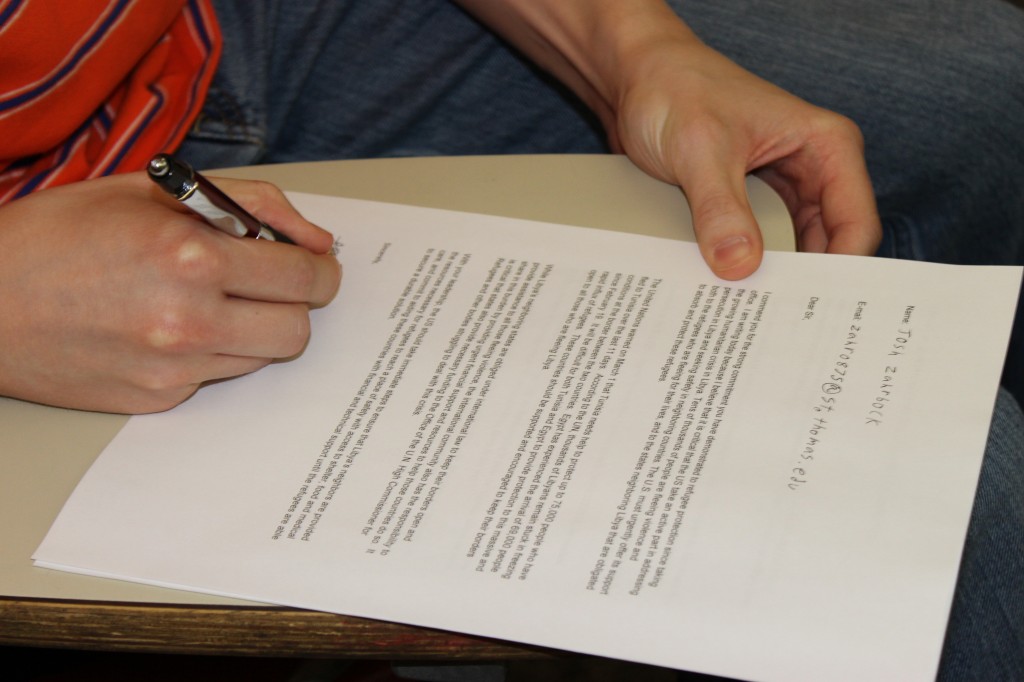About 20 St. Thomas students and members of St. Thomas’ Amnesty International chapter gathered March 8 in O’Shaughnessy Educational Center to sign petitions pressuring U.S. politicians to support an end to violence against civilians under Libyan leader Moammar Gadhafi.

Students signed two petitions: one that addressed the refugee situation in Libya and another that presented possible solutions to ending the violence, such as a no-fly zone over Libya to halt airstrikes. The petitions will be sent to the U.S. Libyan Embassy and to the Obama administration at the White House.
Sophomore Rose Nash, who is from Libya’s capital city, Tripoli, and still has family living there, said activism, including petitions and protests, is long overdue.
“Libyans have just been waiting for this spark to ignite,” Nash said. “They’ve been waiting for this for 42 years.”
Gadhafi’s influence
Gadhafi rose to power Sept. 1, 1969, after staging a military coup. He and his seven sons exercised control over Libya, particularly using mercenaries and militants to quell uprisings and ensure complete authority.
“He is killing his own people in order to stay in power,” Nash said.
Since Gadhafi and his sons have gained complete control over the military, about 6,000 Libyan civilians have been killed and thousands are still missing. But Gadhafi and his sons have denied involvement in any deaths and injuries.
Libyan citizens began protesting Gadhafi’s regime February 15. Nash said the recent Egypt and Tunisia dictatorship protests are incentive for Libyan citizens to revolt.
“The Egyptians did it. Why can’t we do it, too?” Nash said.
Petitioning for change
Sophomore Sara Vue said she was inspired to attend the petition-signing event after seeing Libyan news coverage. She said the petitions could affect the delivery of essential supplies to Libyan citizens.
“I think both of [the petitions] are really good, especially with helping those refugees who are starving and with aid, such as medical and food [supplies],” Vue said.
Sophomore Sadaf Rahmani, president of the St. Thomas chapter of Amnesty International, emphasized the importance of every voice.
“Even one petition counts,” she said. “It might seem powerless and small but it counts.”
Rahmani said the petitions are the first step “to educate people so they know what’s going on and not let this happen again in the future because we are the next generation.”
He added that the petitions will also “get the word to the U.S. administration and to governments around the world because they need to know that people care.”
Sophomore Samali Mutazindwa from Uganda said she felt it was necessary to attend the event and sign the petition to show her support, especially because she said understands the oppression occurring in Libya.
Nash said she had to do something to help the situation in Libya.
“I have this burning that’s inside of my heart and has been going since this uprising started, because people are still dying, people are still losing their lives, and for what? Because they asked for their freedom?” Nash said.
Sophomore Laura Nagel said it’s difficult to fully understand Nash’s situation and what it is like to have family in a region such as Libya.
“I’ve never been in a situation anything near that, so it’s hard for me to comprehend what that must feel like,” she said.
Rebecca Omastiak can be reached at omas5009@stthomas.edu.
